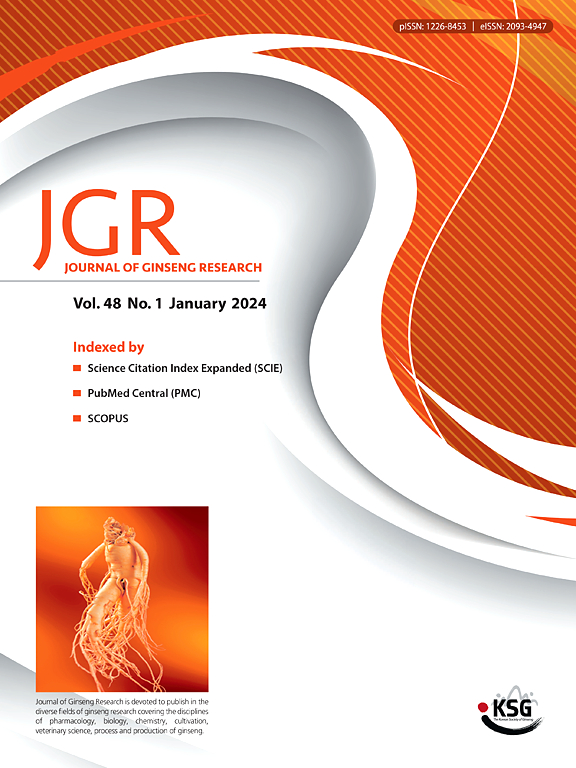人参能保护身体免受空气中颗粒物的有害影响吗?
IF 5.6
2区 医学
Q1 CHEMISTRY, MEDICINAL
引用次数: 0
摘要
最近的研究表明,暴露于空气中的颗粒物(PM)通过多种机制对人体健康产生不利影响,包括氧化应激、炎症反应、细胞凋亡、自噬、铁下垂和内质网应激。天然产物具有广泛的生理和药理活性,但毒性低于合成药物;近年来,天然产物在食品和药物开发领域越来越受欢迎。人参是比较知名的天然产物之一,最近有越来越多的报道表明,人参可以减轻暴露于PM引起的毒性。本文综述了人参衍生物质(总提取物、皂苷部分、非皂苷部分及其成分等)在pm诱导不良反应中的潜在积极作用,并讨论了其在食品和药物开发中的潜在应用,以预防和治疗pm诱导的不良反应。尽管有一些有希望的发现,目前的研究可能受到缺乏全面的临床研究和标准化方法的限制。未来的研究应优先研究人参的临床疗效和开发先进的配方,以最大限度地发挥其对pm诱导的健康风险的保护潜力。本文章由计算机程序翻译,如有差异,请以英文原文为准。

Can Panax ginseng help protect the body from the harmful effects of airborne particulate matter?
Recent studies have shown that exposure to airborne particulate matter (PM) adversely affects human health through various mechanisms, including oxidative stress, inflammatory response, apoptosis, autophagy, ferroptosis, and endoplasmic reticulum stress. Natural products have a wide range of physiological and pharmacological activities but with less toxicity than synthetic drugs; in recent years, natural products have become increasingly popular in the field of food and drug development. Panax (P.) ginseng is one of the more well-known natural products, and there have recently been increasing reports indicating that P. ginseng may alleviate toxicity caused by exposure to PM. In the current review, we summarize the positive potential role that P. ginseng-derived substances (total extract, saponin fraction, non-saponin fraction, their ingredients, etc.) have on PM-induced adverse reactions, and we also discuss their potential utility in food and drug development for prevention and treatment. Despite some promising findings, current research may be limited by a lack of comprehensive clinical studies and standardized methodologies. Future research should prioritize the investigation of P. ginseng's clinical efficacy and the development of advanced formulations to maximize its protective potential against PM-induced health risks.
求助全文
通过发布文献求助,成功后即可免费获取论文全文。
去求助
来源期刊

Journal of Ginseng Research
CHEMISTRY, MEDICINAL-INTEGRATIVE & COMPLEMENTARY MEDICINE
CiteScore
11.40
自引率
9.50%
发文量
111
审稿时长
6-12 weeks
期刊介绍:
Journal of Ginseng Research (JGR) is an official, open access journal of the Korean Society of Ginseng and is the only international journal publishing scholarly reports on ginseng research in the world. The journal is a bimonthly peer-reviewed publication featuring high-quality studies related to basic, pre-clinical, and clinical researches on ginseng to reflect recent progresses in ginseng research.
JGR publishes papers, either experimental or theoretical, that advance our understanding of ginseng science, including plant sciences, biology, chemistry, pharmacology, toxicology, pharmacokinetics, veterinary medicine, biochemistry, manufacture, and clinical study of ginseng since 1976. It also includes the new paradigm of integrative research, covering alternative medicinal approaches. Article types considered for publication include review articles, original research articles, and brief reports.
JGR helps researchers to understand mechanisms for traditional efficacy of ginseng and to put their clinical evidence together. It provides balanced information on basic science and clinical applications to researchers, manufacturers, practitioners, teachers, scholars, and medical doctors.
 求助内容:
求助内容: 应助结果提醒方式:
应助结果提醒方式:


